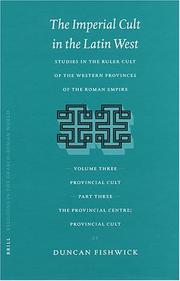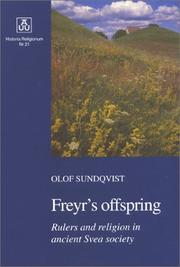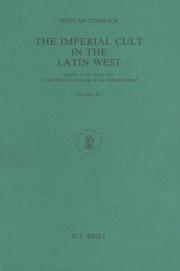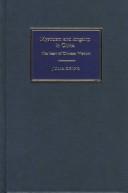| Listing 1 - 10 of 20 | << page >> |
Sort by
|
Book
Year: 1958 Publisher: Oxford : Clarendon press,
Abstract | Keywords | Export | Availability | Bookmark
 Loading...
Loading...Choose an application
- Reference Manager
- EndNote
- RefWorks (Direct export to RefWorks)
Kings and rulers (in religion, folk-lore, etc.) --- Mythology --- Ritual --- Mythologie --- Rituel
Book
ISSN: 15592944 ISBN: 9781885923554 1885923554 Year: 2008 Publisher: Chicago : Oriental Institute of the University of Chicago,
Abstract | Keywords | Export | Availability | Bookmark
 Loading...
Loading...Choose an application
- Reference Manager
- EndNote
- RefWorks (Direct export to RefWorks)
Kings and rulers --- Divine right of kings. --- Religious aspects. --- Conferences - Meetings --- Divine right of kings --- Kings and rulers (in religion, folk-lore, etc.) --- Apotheosis --- Gods --- Theocracy --- Higher law --- Kings, Divine right of --- Authority --- Monarchy --- Prerogative, Royal --- Religious aspects --- Cultus --- Divinity

ISSN: 09277633 ISBN: 9004128069 9004125396 9004125361 9004128077 9789004153219 9004153217 9047412761 9047416112 9004295968 9004301690 9789004128071 9789004125391 9789004128064 9789004125360 9789004301696 9789047416111 9789004295964 Year: 2004 Volume: 145-148 Publisher: Leiden Brill
Abstract | Keywords | Export | Availability | Bookmark
 Loading...
Loading...Choose an application
- Reference Manager
- EndNote
- RefWorks (Direct export to RefWorks)
This volume focuses on the headquarters of provincial cults and the principal features of the worship offered there on behalf of the province. Evidence for provincial centres survives in various forms of varying degress of reliability but, while no standard pattern emerges, it seems clear that every province established a permanent base that served similar cultic, administrative, recreational and ideological purposes. Traces of provincial worship are more fleeting but a rough picture can be reconstructed of priestly regalia and of the calendar, rites and associated liturgy and ceremonial that marked the differing cults of individual provinces. Both studies conclude with an overview of the main conclusions and are profusely illustrated with over a hundred plates or diagrams.
292.07 --- Religion Classical Roman --- Rome --- Kings and rulers --- Religious aspects. --- Religion. --- Kings and rulers (in religion, folk-lore, etc.) --- Apotheosis --- Divine right of kings --- Gods --- Theocracy --- Cultus --- Divinity --- Rome (Empire) --- Rim --- Roman Empire --- Roman Republic --- Romi (Empire) --- Byzantine Empire --- Italy --- Roman Republic (510-30 B.C.) --- Rome (Italy) --- Religion, Primitive --- Atheism --- Irreligion --- Religions --- Theology

ISBN: 0809132524 Year: 1991 Publisher: New York Mahwah Paulist Press
Abstract | Keywords | Export | Availability | Bookmark
 Loading...
Loading...Choose an application
- Reference Manager
- EndNote
- RefWorks (Direct export to RefWorks)
Kings and rulers --- Mythology --- Kings and rulers - Mythology. --- 291.13 --- 321.152 --- Kings and rulers (in religion, folk-lore, etc.) --- Apotheosis --- Cults --- 291.13 Mythe. Vergelijkende mythologie --- Mythe. Vergelijkende mythologie --- 321.152 Theocratisch koningschap. Theokratie --(poltieke stelsels) --- Theocratisch koningschap. Theokratie --(poltieke stelsels)

ISBN: 9155452639 Year: 2002 Volume: 21 Publisher: Uppsala : Acta universitatis upsaliensis,
Abstract | Keywords | Export | Availability | Bookmark
 Loading...
Loading...Choose an application
- Reference Manager
- EndNote
- RefWorks (Direct export to RefWorks)
293.1 --- Godsdiensten van de Germaanse Scandinaviërs. Germaanse mythologie. Edda's.Saga's --- Kings and rulers --- Mythology. --- 293.1 Godsdiensten van de Germaanse Scandinaviërs. Germaanse mythologie. Edda's.Saga's --- Kings and rulers (in religion, folk-lore, etc.) --- Apotheosis --- Cults --- Mythology --- Sweden --- Suède --- Zweden --- Schweden --- Svezia --- Suecia --- Zviedrija --- Shvet︠s︡ii︠a︡ --- Szwecja --- Sverige --- Konungariket Sverige --- Kingdom of Sweden --- スウェーデン --- Suwēden --- Religious life. --- Religions anciennes scandinaves

ISBN: 9004091440 9004071792 9004094954 9004071806 9004295755 9004295763 9004297545 9789004071797 9789004094956 9789004091443 Year: 1987 Volume: 108, 145-148 Publisher: Leiden Brill
Abstract | Keywords | Export | Availability | Bookmark
 Loading...
Loading...Choose an application
- Reference Manager
- EndNote
- RefWorks (Direct export to RefWorks)
Open worship of the Roman Emperor with sacrifice, priests, altar and temple was in theory contrary to official policy in Rome. The cult of the living emperor by less direct means, however, might be achieved in various ways: the offering of cult to his companion genius or the divine numen immanent within him; the elevation of the Imperial house to a level at which it became godlike; the formal placing of the emperor on a par with the gods by making dedications to him ut deo ; the conversion of divinities of every kind into Augustan gods that served as the Emperor's helper and protector; the creation of Augustan Blessings and Virtues that personified the qualities and benefactions of the emperor. Volume II, 2 completes the preliminary set of studies with a select bibliography, indexes and corrigenda to Vols. I, 1-2 and II, 1.
292.213 --- Religion Classical Greek and Roman Ancestors, heroes, monarchs, saints, the dead --- Rome --- Kings and rulers --- Religious aspects. --- Religion. --- Roman history --- Religious aspects --- Religion --- Rois et souverains --- Aspect religieux --- Emperor worship --- Herodotus --- Criticism and interpretation --- Rim --- Roman Empire --- Roman Republic (510-30 B.C.) --- Romi (Empire) --- Byzantine Empire --- Rome (Italy) --- Religion, Primitive --- Atheism --- Irreligion --- Religions --- Theology --- Kings and rulers (in religion, folk-lore, etc.) --- Apotheosis --- Divine right of kings --- Gods --- Theocracy --- Cultus --- Divinity --- Rome (Empire) --- Roman Republic --- Italy
Book
ISBN: 9781782383567 1782383565 9781782383574 1782383573 Year: 2014 Volume: 2 Publisher: New York, N.Y. Berghahn
Abstract | Keywords | Export | Availability | Bookmark
 Loading...
Loading...Choose an application
- Reference Manager
- EndNote
- RefWorks (Direct export to RefWorks)
France and England are often seen as monarchies standing at opposite ends of the spectrum of seventeenth-century European political culture. On the one hand the Bourbon monarchy took the high road to absolutism, while on the other the Stuarts never quite recovered from the diminution of their royal authority following the regicide of Charles I in 1649. However, both monarchies shared a common medieval heritage of sacral kingship, and their histories remained deeply entangled throughout the century. This study focuses on the interaction between ideas of monarchy and images of power in the t
Kings and rulers --- Divine right of kings. --- Monarchy --- Rois et souverains --- Droit divin des rois --- Monarchie --- Religious aspects --- Christianity --- History --- Aspect religieux --- Christianisme --- Histoire --- Religious aspects. --- Political philosophy. Social philosophy --- History of civilization --- anno 1600-1699 --- France --- United Kingdom --- History of the United Kingdom and Ireland --- History of France --- Religious studies --- Christianity. --- Droit divin des rois. --- Aspect religieux. --- Kingdom (Monarchy) --- Executive power --- Political science --- Royalists --- Higher law --- Kings, Divine right of --- Authority --- Prerogative, Royal --- Kings and rulers (in religion, folk-lore, etc.) --- Apotheosis --- Divine right of kings --- Gods --- Theocracy --- Cultus --- Divinity
Book
ISBN: 9781934536643 1934536644 1322513163 1934536652 Year: 2013 Volume: 6 Publisher: Philadelphia, Pennsylvania : University Museum,
Abstract | Keywords | Export | Availability | Bookmark
 Loading...
Loading...Choose an application
- Reference Manager
- EndNote
- RefWorks (Direct export to RefWorks)
Kings and rulers --- Divine right of kings --- Political customs and rites --- Power (Social sciences) --- Political anthropology --- Rois et souverains --- Droit divin des rois --- Moeurs politiques --- Pouvoir (Sciences sociales) --- Anthropologie politique --- Religious aspects --- Aspect religieux --- Egypt --- Iraq --- Egypte --- Irak --- Divine right of kings. --- Political anthropology. --- Religious aspects. --- Kings and rulers. --- History --- Conferences - Meetings --- Empowerment (Social sciences) --- Political power --- Exchange theory (Sociology) --- Political science --- Social sciences --- Sociology --- Consensus (Social sciences) --- Customs and rites, Political --- Political rituals --- Rituals, Political --- Manners and customs --- Rites and ceremonies --- Anthropology, Political --- Government, Primitive --- Ethnology --- Kings and rulers (in religion, folk-lore, etc.) --- Apotheosis --- Gods --- Theocracy --- Higher law --- Kings, Divine right of --- Authority --- Monarchy --- Prerogative, Royal --- Anthropological aspects --- Cultus --- Divinity
Book
ISBN: 221359516X Year: 1995 Publisher: Paris Fayard
Abstract | Keywords | Export | Availability | Bookmark
 Loading...
Loading...Choose an application
- Reference Manager
- EndNote
- RefWorks (Direct export to RefWorks)
Kings and rulers --- Monarchy --- Symbolism in politics --- Rois et souverains --- Monarchie --- Symbolisme en politique --- Mythology --- Religious aspects --- Mythologie --- Aspect religieux --- -Kings and rulers --- -Monarchy --- Regalia (Insignia) --- #gsdb8 --- Symbolic politics --- Political science --- Insignia, Royal --- Royal insignia --- Emblems --- Insignia --- Kingdom (Monarchy) --- Executive power --- Royalists --- Kings and rulers, Primitive --- Monarchs --- Royalty --- Rulers --- Sovereigns --- Heads of state --- Monarchy. --- Symbolism in politics. --- Mythology. --- Religious aspects. --- Regalia (Insignia). --- Kings and rulers (in religion, folk-lore, etc.) --- Apotheosis --- Divine right of kings --- Gods --- Theocracy --- Cults --- Cultus --- Divinity --- MONARCHIE --- ROYAUTE --- POLITIQUE ET GOUVERNEMENT --- CIVILISATION --- CONCEPTION --- HISTOIRE --- Politique et gouvernement

ISBN: 0521462932 0521468280 0511612044 0511007485 9780521468282 9780511612046 9780521462938 Year: 1997 Volume: 11 Publisher: Cambridge Cambridge University Press
Abstract | Keywords | Export | Availability | Bookmark
 Loading...
Loading...Choose an application
- Reference Manager
- EndNote
- RefWorks (Direct export to RefWorks)
In this book, Julia Ching offers a magisterial survey of over four thousand years of Chinese civilisation through an examination of the relationship between kingship and mysticism. She investigates the sage-king myth and ideal, arguing that institutions of kingship were bound up with cultivation of trance states and communication with spirits. Over time, these associations were retained, though sidelined, as the sage-king myth became a model for the actual ruler, with a messianic appeal for the ruled. As a paradigm, it also became appropriated by private individuals who strove for wisdom without becoming kings. As the Confucian tradition interacted with the Taoist and the Buddhist, the religious character of spiritual and mystical cultivation became more pronounced. But the sage-king idea continued, promoting expectations of benevolent despotism rather than democratisation in Chinese civilisation.
Kings and rulers --- Philosophy, Confucian. --- Rois et souverains --- Philosophie confucéenne --- Religious aspects. --- Aspect religieux --- China --- Chine --- Kings and rulers. --- Politics and government --- Politique et gouvernement --- S06/0200 --- S12/0216 --- China: Politics and government--Government and political institutions: general and before 1911 --- China: Philosophy and Classics--Political philosophy --- Politics and government. --- Philosophie confucéenne --- Philosophy, Confucian --- Confucian philosophy --- Confucianism --- Philosophy, Chinese --- Kings and rulers (in religion, folk-lore, etc.) --- Apotheosis --- Divine right of kings --- Gods --- Theocracy --- Religious aspects --- Cultus --- Divinity --- Arts and Humanities --- Religion --- Kings and rulers - Religious aspects.
| Listing 1 - 10 of 20 | << page >> |
Sort by
|

 Search
Search Feedback
Feedback About UniCat
About UniCat  Help
Help News
News